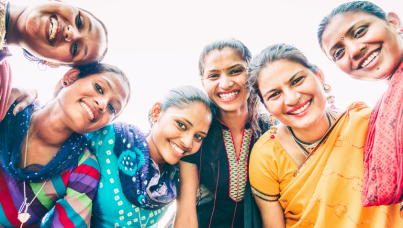

Indians perceive artificial intelligence more a boon than bane, yet tread with prudence in AI adoption: Ipsos AI Monitor 2024
Unlike some of the global markets that are over exuberant about AI, a highly labour-intensive market like India is viewing AI in a rational and prudent way, for instance, while over 6 in 10 urban Indians (64%) claimed to have a good understanding of AI, some of the markets were miles ahead in their understanding of AI - especially Indonesia (86%), Mexico (80%), Peru (76%), South Africa (76%), Thailand (75%) and Türkiye (74%). India was in fact placed 23rd in the pecking order.
Surprised?
Attitudes to AI
62% Indians claimed to be aware of the products and services using AI, while claimed awareness was higher in China (81%) and Indonesia (80%). Though there was a visible trepidation among Indians with 1 in 2 (51%) claiming to be nervous about the products and services using AI. Nervousness around AI was more palpable among the citizens of Ireland (67%), New Zealand (66%), Great Britain (64%), United States (64%) and Australia (63%). Paradoxically, 63% Indians polled were excited about products and services using AI. And some of the Asian markets had more number of their citizens excited, particularly in China (80%), Indonesia (76%), Thailand (76%) and South Korea (73%). Also due to the general perception that AI has more benefits than drawbacks – the views being endorsed by Indians (62%) and more vehemently by the citizens of China (83%), Indonesia (80%) and Thailand (80%).
Trust in AI
6 in 10 urban Indians (60%) said they trusted companies using artificial intelligence (AI) to protect their data; and 63% Indians trusted AI to neither discriminate, nor show bias towards any group of people. Interestingly 63% Indians trusted people to not discriminate or show bias towards any group of people. Trust in technology was at par with humans. Though among global citizens, trust in AI not discriminating or showing bias towards any people was greater (54%) vis-à-vis trust in people not discriminating or showing bias towards any people (45%).
AI and the Future
What has been the impact of AI in everyday life of citizens? 65% Indians say products and services using AI has profoundly changed my daily life in the past 3-5 years and further, 65% of Indians polled said products and services using AI will profoundly change my daily life in the next 3-5 years.
About AI’s impact on jobs in the next 5 years, only 1 in 4 urban Indians (26%) felt it was likely that AI would change how they do their current job in the next 5 years. Indonesians were more concerned with 44% believing in the likelihood. Thais (28%) and Chinese (21%) were less concerned about AI’s impact on how they would do their current job in the next 5 years.
Interestingly, 54% urban Indians polled (20% very likely +30% somewhat likely) felt it was likely for AI to replace their current job in the next 5 years. The view was heightened in Thailand (69%), Indonesia (66%), Türkiye (63%) and Malaysia (62%) etc.
Increased usage of AI was seen both as a boon and a bane: 46% of urban Indians polled said increased usage of AI will make their job better; 49% urban Indians said the amount of disinformation on the internet would get better; 48% Indians expected the job market to get better with the increased use of AI; 52% Indians expected the economy to get better in the country with the increased use of AI; 52% Indians expected their entertainment options (TV/ video content, movies, music, books) to get better with increased usage of AI; 52% Indians expected the time taken to get the work done to get better with the increased usage of AI and 51% Indians expected their health to get better with the increased usage of AI.
Summarizing on the findings of the survey, Amit Adarkar, CEO, Ipsos India said, “India is at the inflexion point, where it sees the rationale of hopping onto the artificial intelligence bandwagon, at the same time it is treading with caution. Though the merits of AI in the products and services is already understood and felt by a number of Indians in their daily lives. AI is definitely going to impact our current jobs and we see mixed emotions of excitement and nervousness at the same time around AI. And also some of the risks of disinformation. It will definitely make our lives better across different facets of job, economy, health, entertainment and increasing efficiencies. Trust in AI is high in terms of protecting personal data. Interestingly, AI is perceived to be at par with humans in terms of trust in non-discrimination and being unbiased towards others. A tech savvy and labour-intensive country like India, trails some of its Asian counterparts in its exuberance towards AI, as it is still early days, with no govt regulation or guardrails around this technology, it is right now seen more as an assistant to human intelligence.”
Ipsos APEC CEO, Hamish Munro, said: “People are still firmly divided over whether AI will be a friend or foe in the coming years. Across the APAC region, Asian countries are leading the charge for embracing the technology, showing both a strong understanding and excitement about the technology. English-speaking countries, including Australia and New Zealand, remain skeptical about AI, particularly its impact on their day-to-day life and employment. Greater education around the technology and practical examples may help to build confidence in the AI revolution and how it can be harnessed to improve everyday life."
About the study
This study did not have any external sponsors or partners. It was initiated and run by Ipsos, because we are curious about the world we live in and how citizens around the globe think and feel about their world.
These are the results of a 32-country survey conducted by Ipsos on its Global Advisor online platform and, in India, on its IndiaBus platform, between Friday, April 19 and Friday, May 3, 2024.
For this survey, Ipsos interviewed a total of 23,685 adults aged 18 years and older in India, 18-74 in Canada, Republic of Ireland, Israel, Malaysia, South Africa, Türkiye, and the United States, 20-74 in Thailand, 21-74 in Indonesia and Singapore, and 16-74 in all other countries.
The sample consists of approximately 1,000 individuals each in Australia, Brazil, Canada, mainland China, France, Germany, Great Britain, Italy, Japan, New Zealand, Spain, and the U.S., and 500 individuals each in Argentina, Belgium, Chile, Colombia, Hungary, Indonesia, Ireland, Malaysia, Mexico, the Netherlands, Peru, Poland, Singapore, South Africa, South Korea, Sweden, Switzerland, Thailand, and Türkiye.
The sample in India consists of approximately 2,200 individuals, of whom approximately 1,800 were interviewed face-to-face and 400 were interviewed online. Samples in Argentina, Australia, Belgium, Canada, France, Germany, Great Britain, Hungary, Italy, Japan, the Netherlands, New Zealand, Poland, South Korea, Spain, Sweden, Switzerland, and the U.S. can be considered representative of their general adult populations under the age of 75. Samples in Brazil, Chile, China, Colombia, Indonesia, Ireland, Malaysia, Mexico, Peru, Singapore, South Africa, Thailand, and Turkey are more urban, more educated, and/or more affluent than the general population.
The survey results for these countries should be viewed as reflecting the views of the more “connected” segment of their population. The precision of Ipsos online polls is calculated using a credibility interval with a poll of 1,000 accurate to +/- 3.5 percentage points and of 500 accurate to +/- 5.0 percentage points. For more information on the Ipsos use of credibility intervals, please visit the Ipsos website.
Where results do not sum to 100 or the ‘difference’ appears to be +/-1 more/less than the actual, this may be due to rounding, multiple responses, or the exclusion of don't knows or not stated responses
The publication of these findings abides by local rules and regulations.



